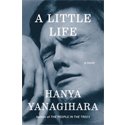 IN BRIEF:
IN BRIEF:
Both traumatising and uplifting, this is a truly extraordinary book about the beauty of friendship and the limits of its potential to ameliorate the life-long damage caused by an abusive childhood.
Details, Details:
Format: Trade Paperback
Pub date: 21/05/2015
Category: Fiction & related items / Modern & contemporary fiction (post c 1945)
Imprint: Picador
Pages: 736
Price: $32.99
Reflections:
It seems almost shameful to say that I nearly didn’t bother with this book.
I downloaded it in August, read a few pages, couldn’t quite keep track of who was who and decided it could not possibly be worth the investment of time. The tale seemed pretty straightforward – four, twenty-something year old friends – JB (the flamboyant artist), Malcolm (the serious architect), Willem (actor/waiter) and Jude (lawyer with a mysterious past) – trying to make it in New York.
Then, a couple of weeks ago, I watched the final episode of ABC TV’s The Book Club (watch it here) where Michael Williams (Director of literary hub, The Wheeler Centre) spoke with such passion about A Little Life that I knew I had to give it another try.
I’ll admit, this time I approached the book with trepidation. Journalist, Leigh Sales, confessed to The Book Club that she had failed to finish the book because she knew of the dark places it would take her – places in which she simply did not want to dwell, given the equally serious nature of her day-time job as a journalist.
With that in mind, I started again.
About 100 pages in, I wanted to pause the world, just so I could keep reading. Yes, this book begins with an equal focus on each of the four friends, but it soon narrows to Jude – and the story of his horrifically abusive childhood, and his efforts, through his love for his friends, to find some kind of peace and live a ‘normal’ adult life – a little life.
I can see why Leigh Sales stopped reading.
Hanya Yanagihara is unflinching in her description of Jude’s abuse. These are uncomfortable, almost unreadable passages. Yet they are important to the book. For Jude, it is a literally unspeakable past. How can he achieve true intimacy with his most cherished friends, when so much of his life remains secret to them?
Fortunately, the darkness in this book is matched by heartbreaking tenderness. I don’t normally cry when reading a book. The fact of it being fiction, and words on a page, are usually enough for me to retain some distance from the emotion. But with this book, there were moments where I couldn’t maintain the fiction; the humanity of the characters moved me beyond words.
Ultimately, this is a book about friendship – that most underrated of relationships. More than that, it’s a book about friendships between men. This alone makes it unique. There is not a single child character in this book. Marriage is not presented as a given, or even an aspiration. It is friendship that sustains Jude and provides his emotional nourishment. But it can’t fix everything. Yanagihara mounts a strong argument for the idea that once a child is broken, it is almost impossible to ‘fix’ the adult – a bleak yet important truth.
In reading this book, it is impossible not to wonder at Yanagihara herself. How did she write this book? Where did it come from? How did she subject herself to the months of emotional turmoil required to write in such detail about abuse? How does she know so much about maths, law, architecture, art and acting? How many lives has this woman lived?
A lot of those questions are answered in this brilliant interview with The Guardian where she talks about the level of violence in the book. “To me you get nowhere second guessing how much can a reader stand and how much can she not. What a reader can always tell is when you are holding back for fear of offending them. I wanted there to be something too much about the violence in the book, but I also wanted there to be an exaggeration of everything, an exaggeration of love, of empathy, of pity, of horror. I wanted everything turned up a little too high. I wanted it to feel a little bit vulgar in places. Or to be always walking that line between out and out sentimentality and the boundaries of good taste. I wanted the reader to really press up against that as much as possible and if I tipped into it in a couple of places, well, I couldn’t really stop it.”
Yanagihara finishes the interview by saying that she has not started work on anything new – that A Little Life ‘still has me in its grip.’
Me too, Hanya. Me too.
.For more information, or to buy the book visit Pan Macmillan
